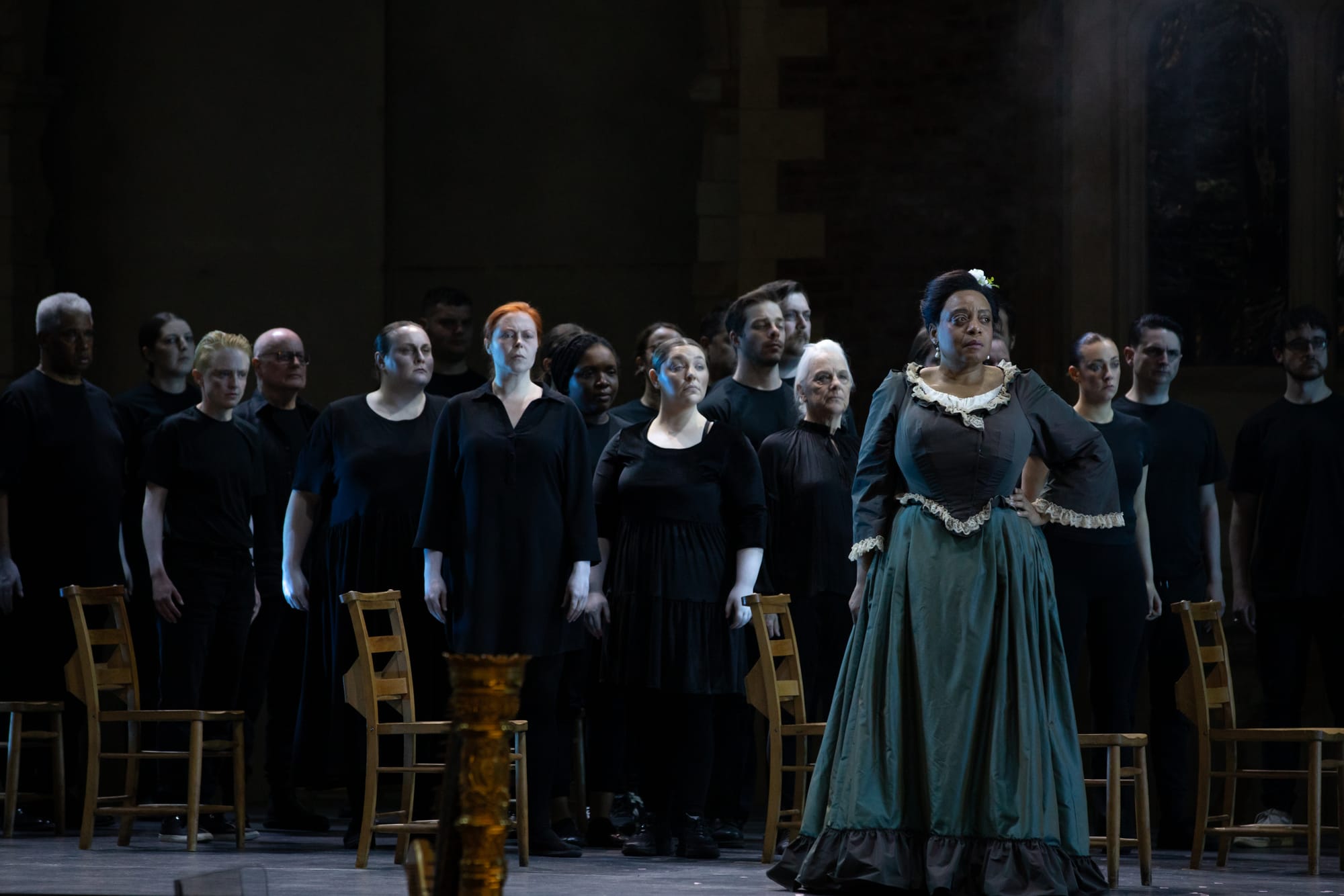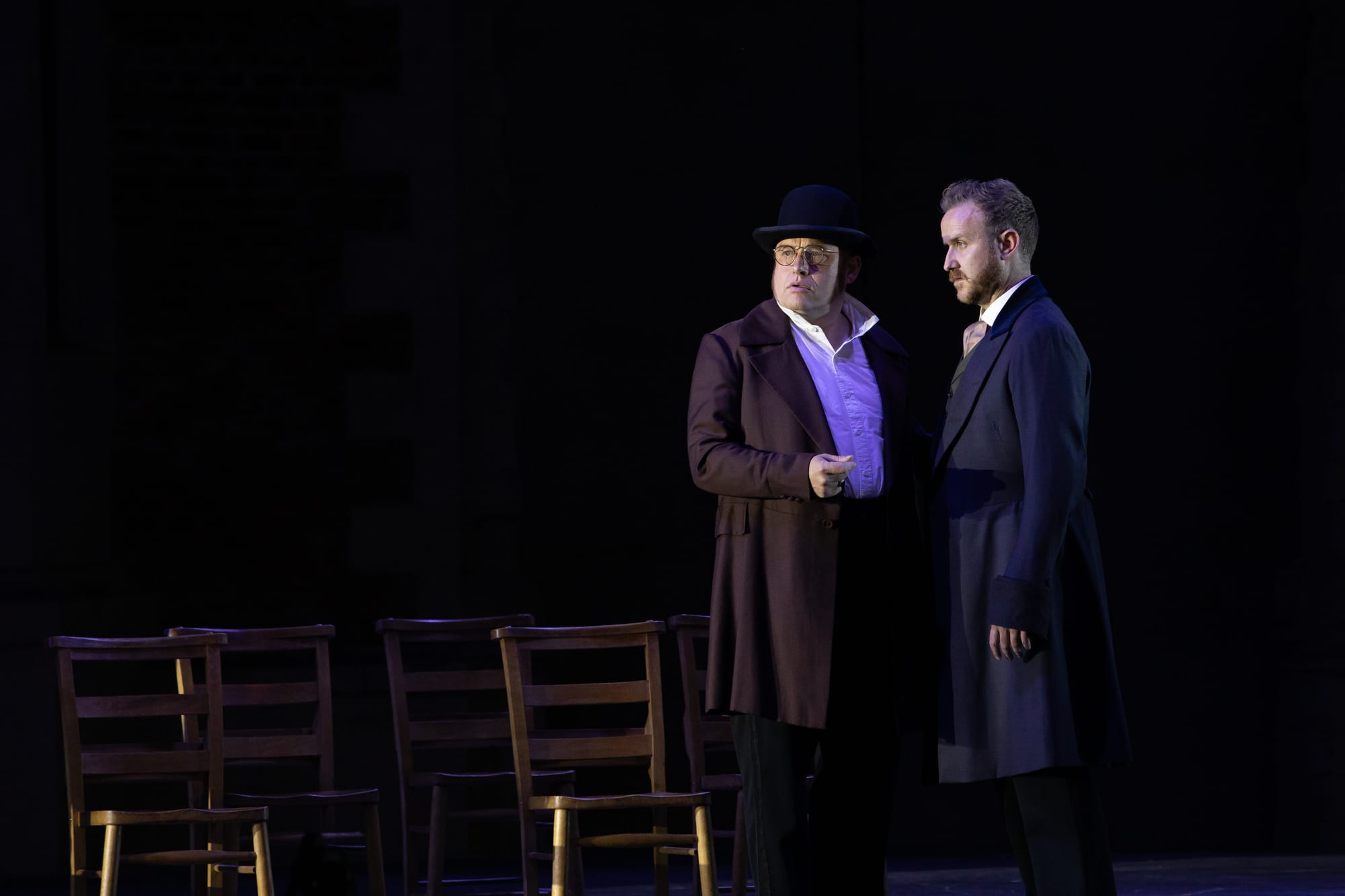
Puccini Edgar (1905 version, semi-staged, orchestral reduction Toby Burke). Cast; Children from Pimlico Musical Foundation and Tiffin School; Opera Holland Park Chorus; City of London Sinfonia / Naomi Woo. Opera Holland Park, Kensington, London, 02.07.2024
Production:
Director – Ruth Knight
Lighting designer – Mark Jonathan
Intimacy and Fight director – Haruka Kuroda
Costume designer / Supervisor – Myfanwy Holland
Cast:
Edgar – Peter Auty
Fidelia – Anne Sophie Duprels
Tigrana – Gweneth Ann Rand
Frank – Julien Van Mellaerts
Gulaltiero – James Cleverton
Young Edgar – Edward Courquin
Young Fidelia – Anhelina Rubanets
Young Tigrana – Hermione Zeleke
Opera Holland Park’s excavations have provided revelation after revelation: one thinks of their UK premiere of Mascagni’s Isabeau in 2018 (review) as just one example. More relevant in this Puccini year (he died November 29, 1924), we have a rare outing for the 1905 score of Edgar (following on from OHP’s Le Vili, back in 2022). What a privilege it is to see this (almost) staged Edgar, then.
The premiere of Edgar took place at La Scala on April 21, 1889. In 1892, Puccini cut the score from four acts to three; the premier of the 1905 version took place in Buenos Aires on July 8 as part of a season in the composer’s honour. No-one is going to pretend this is consistently top-rank Puccini, but I for one come out more on its side than booklet annotator Michele Girardi in his essay A Very Useful Lesson, who is brutally ‘honest’ about the opera’s issues, both in plot and ‘disconnect’ between text and music. When in the moment, though, under Naomi Woo’s confident baton – her beat so clear, her knowledge of the score never in doubt – it was possible to become fully enraptured with the music. The range of references one could point to is large. from Ponchielli to Wagnerian chormaticisms, but the verismo is cradled within a core of Puccini.
The ‘semi-staged’ element is that singers are costumed and fully act out the drama, but there is a lack of stage furniture and decoration. It worked beautifully, so full credit to director Ruth Knight, who seemed to move it more towards Victorian times than the Middle Ages. But the sometimes grizzly interactions of emotions remain constant regardless of era, of course. Mark Jonatha’s lighting was clearly carefully considered, and always effective.
The story of Edgar is taken from the play-in-verse La Coupe et les Lèvres by Alfred de Musset; the librettist is Ferdinando Fontana. The setting is Flanders in 1302. Edgar, in a back story has been living with the debauched Tigrana (who was brought up by the other leading lady’s father). There seems to be clues in the names: the wild animal, Carmen-referencing Tigrana is complemented by the virginal good girl Fidelia. The nexus is Edgar, who on arrival claims he loves Fidelia’s honesty. Frank loves Tigrana, but Edgar runs off with her after a crowd harass her; Frank is wounded in a duel with Edgar in the process. In the second act, Edgar regrets his actions; the arrival of Frank and his platoon allows for suspiciously instant forgiveness and Edgar joins the army. In the final act, Edgar has died (‘died’) and is brought back in a coffin (placed stage front and centre here, with an embossed cross). In a curious twist, Tigrana appears to pray for Edgar and the curate propositions her, asking her to run away with him. riled crowd desecrate the coffin, but it is empty: the ’curate’ is in fact Edgar, who now declares Fidelia his true love. Puccini’s ‘dramma lirico’ ends in tragedy.
As always, then, much emotion. The piece needs a strong hand at the helm, and rarely have I heard such discipline from the City of London Sinfonia than here, under Naomi Woo’s direction. This was her OHP debut (she is Canadian and is an ‘artistic partner’ of Montréal’s Orchestre Métropolitaine). She is zero in on minute detail, but at the same time few conductors could have essayed Puccini’s formal structure, such as it is, better. The orchestral reduction is superbly managed, allowing climaxes to register, but voices are rarely if ever overpowered. The choral contributions were superbly co-ordinated and delivered (we hear Puccini’s penchant for church music, more famously outed in Tosca, here too).
The three children act out, silently, scenes presumably from childhood, including the exclusion of Tigrana, emphasising her status as ‘outsider’. The Opera Holland Park Chorus is in fine form throughout (Puccini gives them plenty to do). The soloists were rather more variable, however. On the credit side, Peter Auty is in fine voice and as dramatically convincing as the plot allows. He relishes Puccini’s long lines and has a sure sense of style.

His Tigrana, Gweneth Ann Rand, last seen as Innkeeper’s Wife / Hen in Vixen at ENO in 2022 (review) seemed less secure, sometimes swooping between notes. There was a similar polarity between Julien Van Mellaerts’ Frank – finely etched, confident (Van Mellaerts has impressed before, as Frédéric in Lakmé and in OHP’s Opera in Song with Anush Hovhanisyan in 2021), against an unexpectedly edgily-toned Anne Sophie Duprels as Fidelia, certainly less convincing than as the titular role in Zazà (Leoncavallo) back in 2017.
As regards this particular run of Edgar, there should be more than three performances, surely … it looked sold out, and on assumes the remaining performances will be, too. Quite right – without hearing this, how can we ‘know’ Puccini? This is the road to greatness, after all. And f you want to get to know the piece via recordings, the 1977 CBS Bergonzi/Scotto (as Fidelia) is surely the most famous, and under Queler’s baton, the score glows. There is also the Domingo DG account conducted by Alberto Veronese (although I find the CBS more convincing overall: MusicWeb International review). Some, too, may wish to seek out Julia Varady’s Fidelia (Naïve, Orchestre de Radio France under Yoel Levi), but José Cura’s Edgar on DVD of the 1889 version might sadly remain elusive for the musicologically curious.
This is Opera Holland Park offering, if not quite a once-in-a-lifeime experience, certainly a rare opportunity. At times when opera houses strggle to survive, this is brave, and the risk pays off. There is hope.
Photos © Ali Wright








